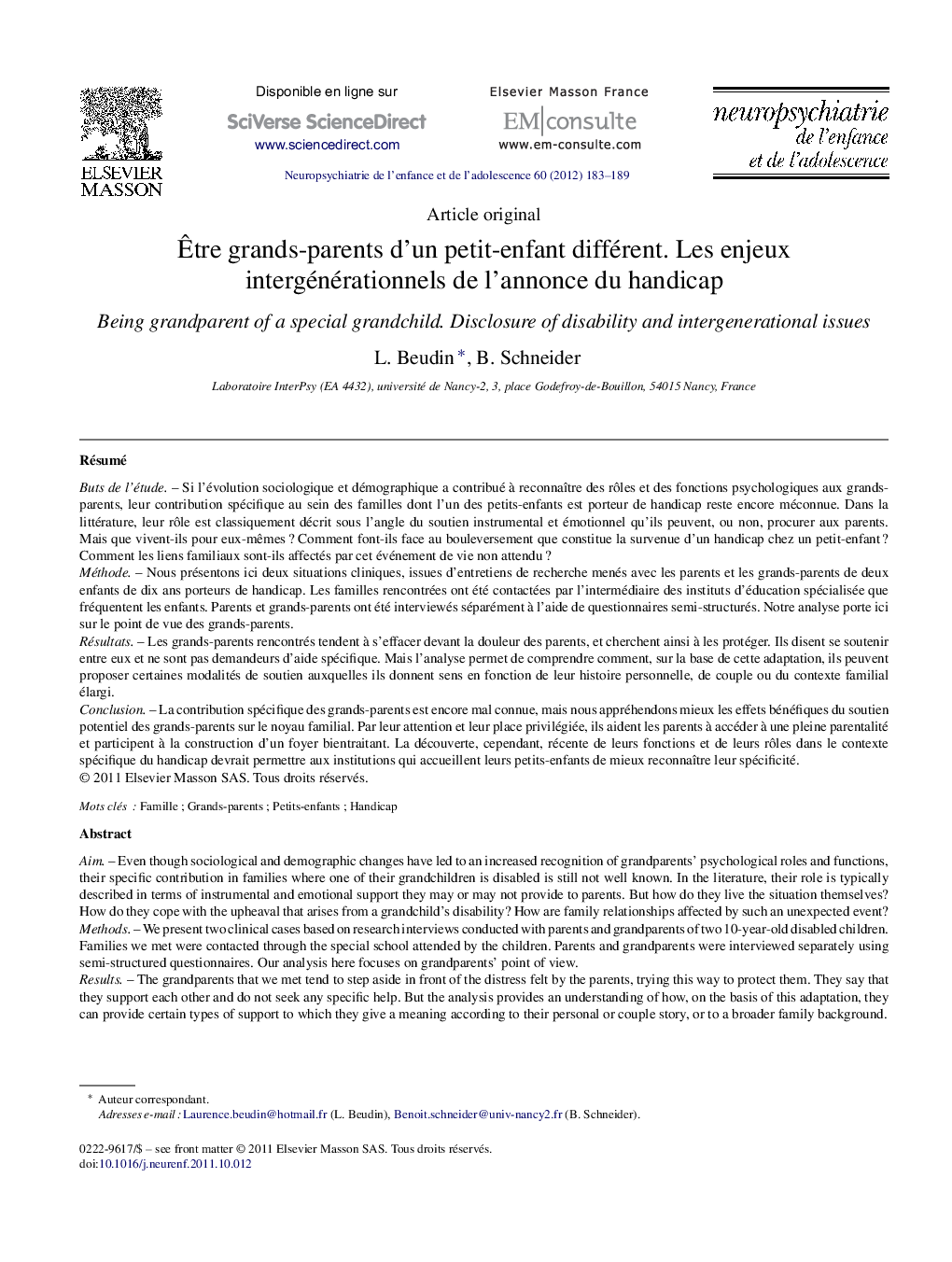| کد مقاله | کد نشریه | سال انتشار | مقاله انگلیسی | نسخه تمام متن |
|---|---|---|---|---|
| 944128 | 925581 | 2012 | 7 صفحه PDF | دانلود رایگان |

RésuméButs de l’étudeSi l’évolution sociologique et démographique a contribué à reconnaître des rôles et des fonctions psychologiques aux grands-parents, leur contribution spécifique au sein des familles dont l’un des petits-enfants est porteur de handicap reste encore méconnue. Dans la littérature, leur rôle est classiquement décrit sous l’angle du soutien instrumental et émotionnel qu’ils peuvent, ou non, procurer aux parents. Mais que vivent-ils pour eux-mêmes ? Comment font-ils face au bouleversement que constitue la survenue d’un handicap chez un petit-enfant ? Comment les liens familiaux sont-ils affectés par cet événement de vie non attendu ?MéthodeNous présentons ici deux situations cliniques, issues d’entretiens de recherche menés avec les parents et les grands-parents de deux enfants de dix ans porteurs de handicap. Les familles rencontrées ont été contactées par l’intermédiaire des instituts d’éducation spécialisée que fréquentent les enfants. Parents et grands-parents ont été interviewés séparément à l’aide de questionnaires semi-structurés. Notre analyse porte ici sur le point de vue des grands-parents.RésultatsLes grands-parents rencontrés tendent à s’effacer devant la douleur des parents, et cherchent ainsi à les protéger. Ils disent se soutenir entre eux et ne sont pas demandeurs d’aide spécifique. Mais l’analyse permet de comprendre comment, sur la base de cette adaptation, ils peuvent proposer certaines modalités de soutien auxquelles ils donnent sens en fonction de leur histoire personnelle, de couple ou du contexte familial élargi.ConclusionLa contribution spécifique des grands-parents est encore mal connue, mais nous appréhendons mieux les effets bénéfiques du soutien potentiel des grands-parents sur le noyau familial. Par leur attention et leur place privilégiée, ils aident les parents à accéder à une pleine parentalité et participent à la construction d’un foyer bientraitant. La découverte, cependant, récente de leurs fonctions et de leurs rôles dans le contexte spécifique du handicap devrait permettre aux institutions qui accueillent leurs petits-enfants de mieux reconnaître leur spécificité.
AimEven though sociological and demographic changes have led to an increased recognition of grandparents’ psychological roles and functions, their specific contribution in families where one of their grandchildren is disabled is still not well known. In the literature, their role is typically described in terms of instrumental and emotional support they may or may not provide to parents. But how do they live the situation themselves? How do they cope with the upheaval that arises from a grandchild's disability? How are family relationships affected by such an unexpected event?MethodsWe present two clinical cases based on research interviews conducted with parents and grandparents of two 10-year-old disabled children. Families we met were contacted through the special school attended by the children. Parents and grandparents were interviewed separately using semi-structured questionnaires. Our analysis here focuses on grandparents’ point of view.ResultsThe grandparents that we met tend to step aside in front of the distress felt by the parents, trying this way to protect them. They say that they support each other and do not seek any specific help. But the analysis provides an understanding of how, on the basis of this adaptation, they can provide certain types of support to which they give a meaning according to their personal or couple story, or to a broader family background.ConclusionGrandparents’ specific contribution is still not well known but we better understand the benefits of the grandparents’ potential support on the family unit. By their attention and special place, they help parents reach a fully fulfilled parenting role and help constructing a welfare home. The yet recent uncovering of their functions and their roles in the specific context of disability should allow institutions that receive their grandchildren to better recognize their specificity.
Journal: Neuropsychiatrie de l'Enfance et de l'Adolescence - Volume 60, Issue 3, May 2012, Pages 183–189